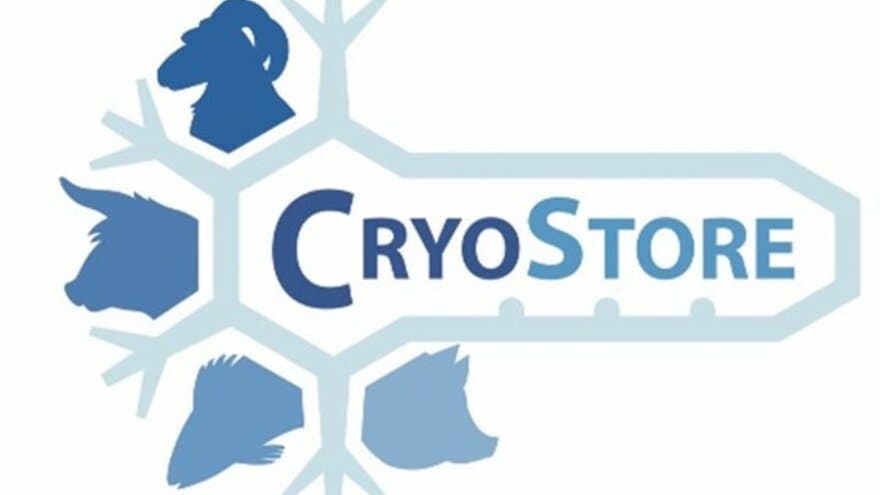Horizon Europe (HORIZON) Marie Skłodowska-Curie Actions Doctoral Networks (MSCA-DN)
This project has received funding from the European Union’s Horizon Europe programme, Marie Skłodowska-Curie Actions, under grant agreement No 101120454

About the project
Aims and objective
CryoStore aims to create a lasting research and education network for a new generation of animal husbandry experts with a broad, multidisciplinary approach to the complexity of modern animal production and the conservation of farm animal biodiversity, taking into account economic, societal and environmental needs.
CryoStore will undertake original and innovative research to address the prevailing technological limitations in the cryopreservation of animal reproductive tissues (germplasm). This will be achieved through the following three research objectives:
- O1. Develop advanced techniques for the visualization and characterization of freeze-thaw damage at the cellular level in reproductive cells and tissues, information deemed critical to improving our understanding of the underlying causes of cryodamage during freezing procedures.
- O2. Develop new procedures for the improved cryopreservation of problematic farm animal germplasm.
- O3. Investigate potential epigenetic risks of cryopreservation procedures, an important area which to date has been largely overlooked.




A vibrant and effective animal breeding and production industry is essential to meet Europe´s increasing need for sustainable and secure food production. Farm animal and fish breeding are global, highly competitive and knowledge intensive sectors, and currently European breeding organisations are global leaders. If Europe is to maintain its competitive advantage in these strategically important industries innovative research is needed in those reproductive technologies that underpin efficient and profitable animal production.
As such, CryoStore will develop innovative technologies for improved cryopreservation of germplasm (gametes, embryos, germ cells) for use in assisted reproductive procedures, leading to increased reproductive efficiency in Europe´s livestock and aquaculture industries. Technological advances in germplasm cryopreservation will also be of key importance to future initiatives aimed at conserving Europe’s livestock biodiversity, through genetic resource banking.
Conserving Europe´s numerous and diverse native breeds, many of which are seriously threatened, will be of crucial importance to future sustainable animal production as genetic biodiversity allows the expression of advantageous traits influencing adaptability to harsh environments or disease resistance. It is likely that selecting for naturally occurring traits will help overcome future difficulties in livestock production wrought by climate change. The intensive training of CryoStore ESRs in a wide range of scientific and transferable skills will greatly enhance their future employability in Europe´s important animal production industries and conservation initiatives.
CryoStore builds on the results of the EU Horizon 2020 project IMAGE (Innovative Management of Animal Genetic Resources) that ended in 2019. The aim of IMAGE was to enhance the use of genetic collections and to upgrade animal gene bank management. IMAGE research focused on the latest developments in DNA technologies and reproductive physiology for collecting, storing and distributing biological resources, including germplasm, with the ultimate goal of demonstrating the benefits of gene banks to the development of more sustainable livestock farming systems.CryoStore will build on the IMAGE project focusing on those areas identified as being of high priority, including new developments for improved germplasm cryopreservation, and most critically the urgent need to train a new generation of young researchers needed to oversee future policies on the conservation of animal genetic resources.
NMBU
Leibniz University Hannover
Prof. Birgit Glasmacher
Dr. Marc Müller
French National Research Institute for Agriculture, Food and Environment
Dr. Catherine Labbé
Dr. Marina GovorunDr. Audrey Laurent
Prof. Marie Saint-DizierUniversity of South Bohemia
Dr. Martin Pšenička
Wageningen University and Research
Dr. Julie Lamy
Dr. Annemieke Rattink
Dr. Sipke Joost Hiemstra
Dr. Arjan P. Palstra
French Poultry and Aquaculture Breeders Technical Center
Dr. Maxime Reverchon
National Institute of Agricultural and Veterinary Research
Dr. Rosa Maria Pereira
IMV Technologies
Dr. Lucie Gavin-Plagne
